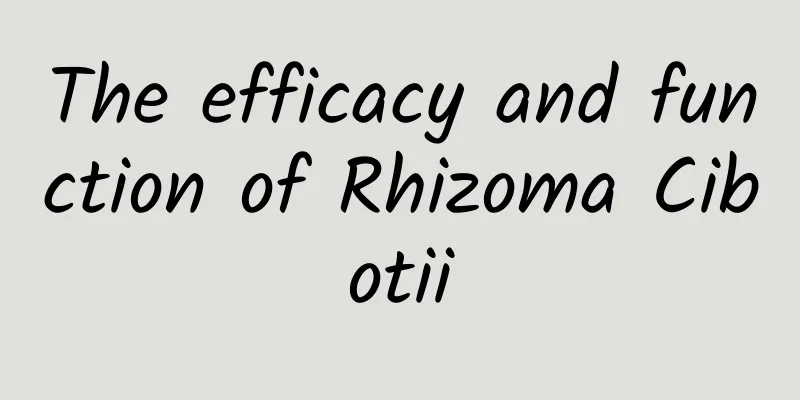What are the effects and functions of the traditional Chinese medicine Polygonatum?

|
I believe that everyone must have heard of the Chinese medicine Polygonatum sibiricum, which is also called chicken head ginseng, and has different names in different regions. The main effect of this medicinal material is to strengthen the spleen and appetite, while also moistening the lungs and relieving cough. People who often suffer from spleen and stomach deficiency can relieve it by taking the Chinese medicine Polygonatum sibiricum. Effects of Polygonatum sibiricum: Polygonatum sibiricum is also known as tiger ginger and chicken-head ginseng. There are three types of polygonatum: ginger-shaped polygonatum, chicken-head polygonatum and large polygonatum. It is the dried rhizome of Polygonatum cyrtonema, Polygonatum cyrtonema or Polygonatum cyrtonema of the Liliaceae family. It has the effects of nourishing yin and moistening the lungs; replenishing the spleen and qi, nourishing the kidneys and replenishing essence. It is often used with Ganmai Dazao Decoction and Peony Root to soften the liver and nourish the heart, and treat children's ADHD and neurosis. It is combined with astragalus, oyster, coptis root, etc. to nourish qi and yin, purge fire and heat, and treat hyperthyroidism. It is used together with hawthorn, wolfberry, Ligustrum lucidum and salvia miltiorrhiza to treat metabolic neutralization syndrome. It can also prevent and treat arteriosclerosis and delay aging. Other names: dragon's mouth, white ji, rabbit bamboo, hanging beads, chicken grid, rice jerky, dodder, deer bamboo, Paris polyphylla, poverty relief, Wu Yizhi, withered Rui, Gou Ge, horse arrow, immortal's surplus food, qi essence, ginger, wild ginger, rice dumpling, wild fairy ginger, mountain ginger, Polygonatum odoratum, white ji and Polygonatum sibiricum, Yang Yuhong, native Ganoderma lucidum, tiger ginger, mountain mortar, chicken head ginseng, Lai ginger. Polygonatum Nature and flavor: sweet; neutral. Meridians: spleen meridian; lung meridian; kidney meridian. Efficacy: Nourishes yin and moistens the lungs; replenishes the spleen and qi, nourishes the kidneys and replenishes essence. Indications: Yin deficiency and fatigue cough; cough due to dryness of the lungs; fatigue due to spleen deficiency; poor appetite and dry mouth; thirst; soreness of waist and knees due to kidney deficiency; impotence and spermatorrhea; tinnitus and blurred vision; premature graying of hair; physical weakness and emaciation; leprosy and tinea. Dosage and Administration: For oral use: decoct in water, 10-15g, fresh product 30-60g; or make into pills, powder or paste. For external use: take appropriate amount, decoct in water for washing; make into paste for application; or soak in wine for application. The role of Polygonatum: Polygonatum sibiricum has the effects of lowering blood pressure, blood sugar, blood lipids, preventing atherosclerosis, delaying aging and antibacterial. Polygonatum sibiricum polysaccharide has an immune activating effect. It is used for yin deficiency and lung dryness, dry cough with little sputum, and chronic cough due to lung and kidney yin deficiency. Used for weak spleen and stomach. It can replenish spleen yin and strengthen spleen qi, and is used for dizziness, soreness of waist and knees, premature graying of hair, and thirst caused by kidney deficiency and essence deficiency. 1. Polygonatum sibiricum strengthens muscles and bones, benefits essence and marrow, and turns hair white: 4 jin each of Polygonatum sibiricum and Atractylodes lancea, 5 jin each of Lycium barbarum root and cypress leaf, and 3 jin of Asparagus cochinchinensis. Boil one stone of juice, add ten pounds of koji and one stone of glutinous rice, and make wine as usual. (Compendium) 2. Polygonatum sibiricum is used to treat diabetes: 15 grams of Polygonatum sibiricum, 15 grams of yam, 12 grams each of Anemarrhena asphodeloides, Polygonatum odoratum and Ophiopogon japonicus. Decoction in water. It is effective for patients with symptoms of thirst, frequent drinking, fatigue and weakness, which are symptoms of deficiency of both Qi and Yin. |
<<: What are the taboos of drinking American ginseng?
>>: What are the effects and functions of Alpinia oxyphylla
Recommend
What are the dietary treatments of Poria cocos?
With the continuous progress of society, people a...
The efficacy and function of Yi Dian Hong [picture]
There are so many medicinal herbs in the world, a...
The efficacy and function of three-leaf copper coin grass
Three-leaf pennywort is a very common Chinese med...
The efficacy and function of oleander
In modern life, everyone is very familiar with va...
Is there really life on Venus?
Last year, scientists from the Royal Astronomical...
Baking soda tablets benefits
Everyone knows that baking soda is actually made ...
World Drowning Prevention Day丨Before you enjoy playing in the water, please check this WHO drowning prevention guide
Did you know? Drowning is the third leading cause...
Why do you want to sleep when it rains? It turns out the answer is not that simple
After a long period of hot weather, has it finall...
Do you prefer strong or weak cooling when taking the subway?
Against the backdrop of rapid development of mode...
The effect of Chinese medicine in promoting ovulation
Many women often experience ovulation discomfort....
Today in Science and Technology History | 1908·7·10 Humans successfully liquefied helium gas for the first time
On July 10, 1908, the discoverer of superconducti...
Sneezing can tear your internal organs. This common behavior carries unexpected risks.
It's hard to imagine that a common sneeze can...
Sea spiders, a species that has survived for 500 million years by "strength"
To live or die, this shouldn't be a question ...
User shopping plans before the crazy shopping season – [Data Infographic]
Everyone knows that consumers spend more during th...









